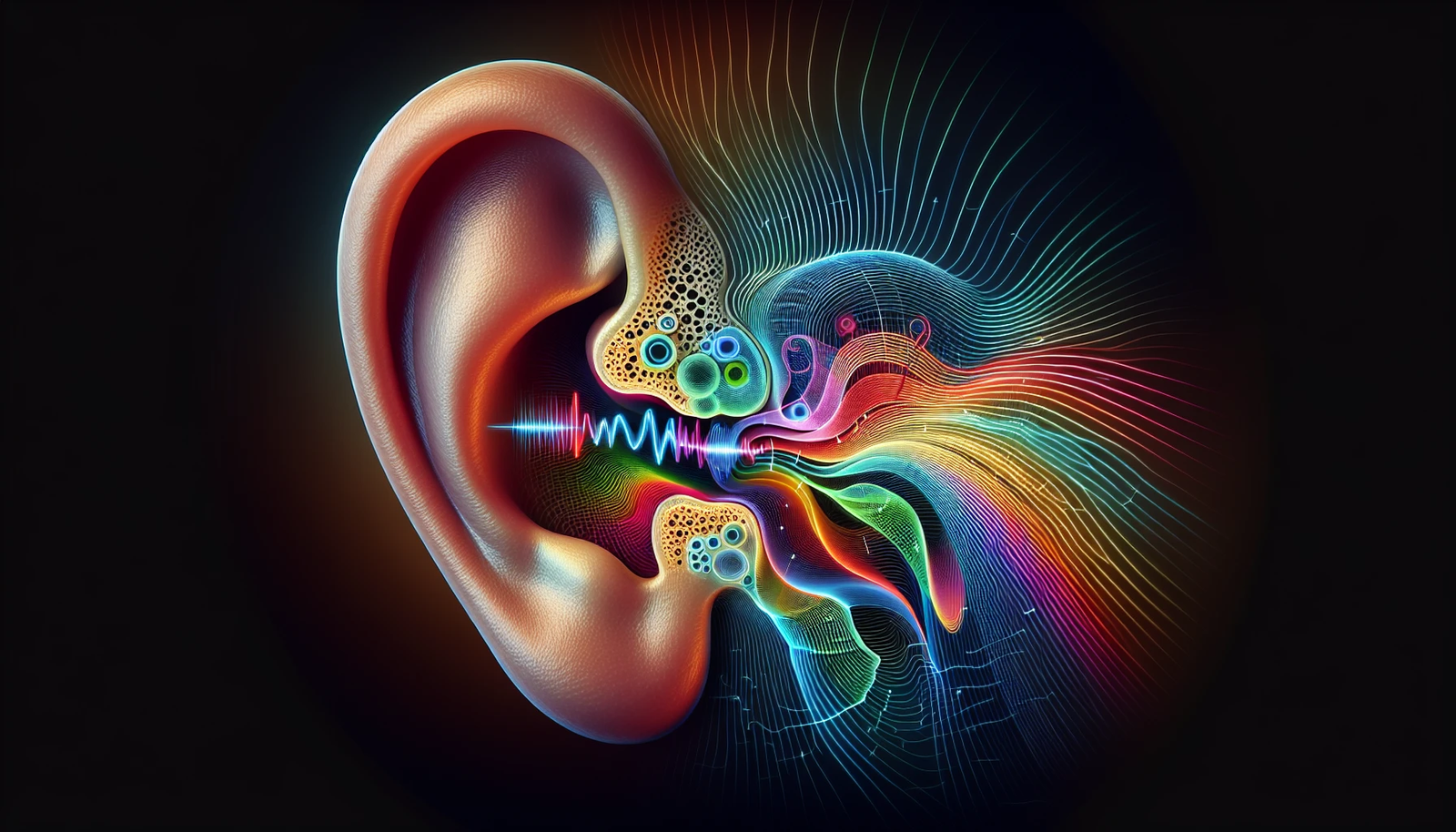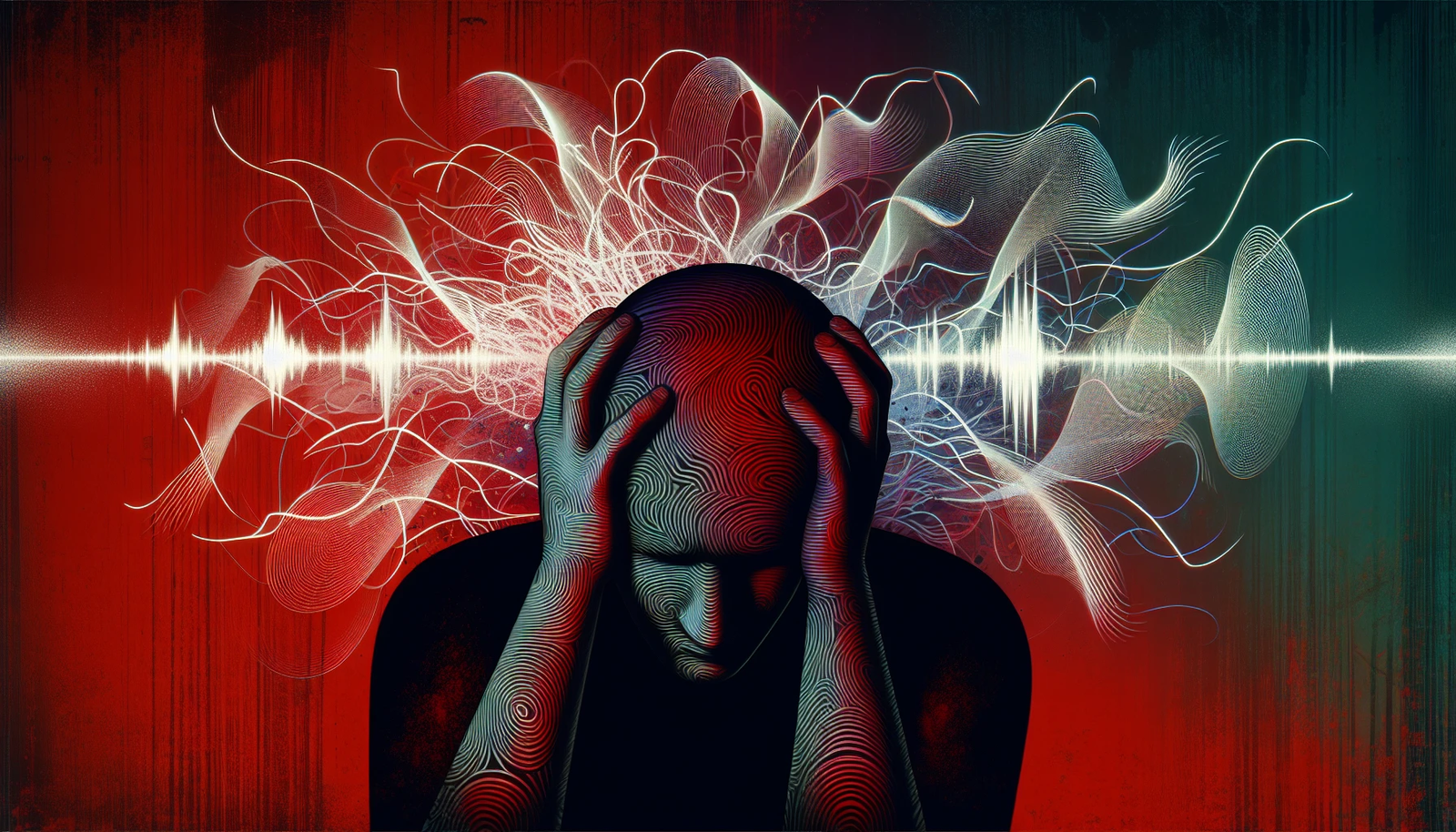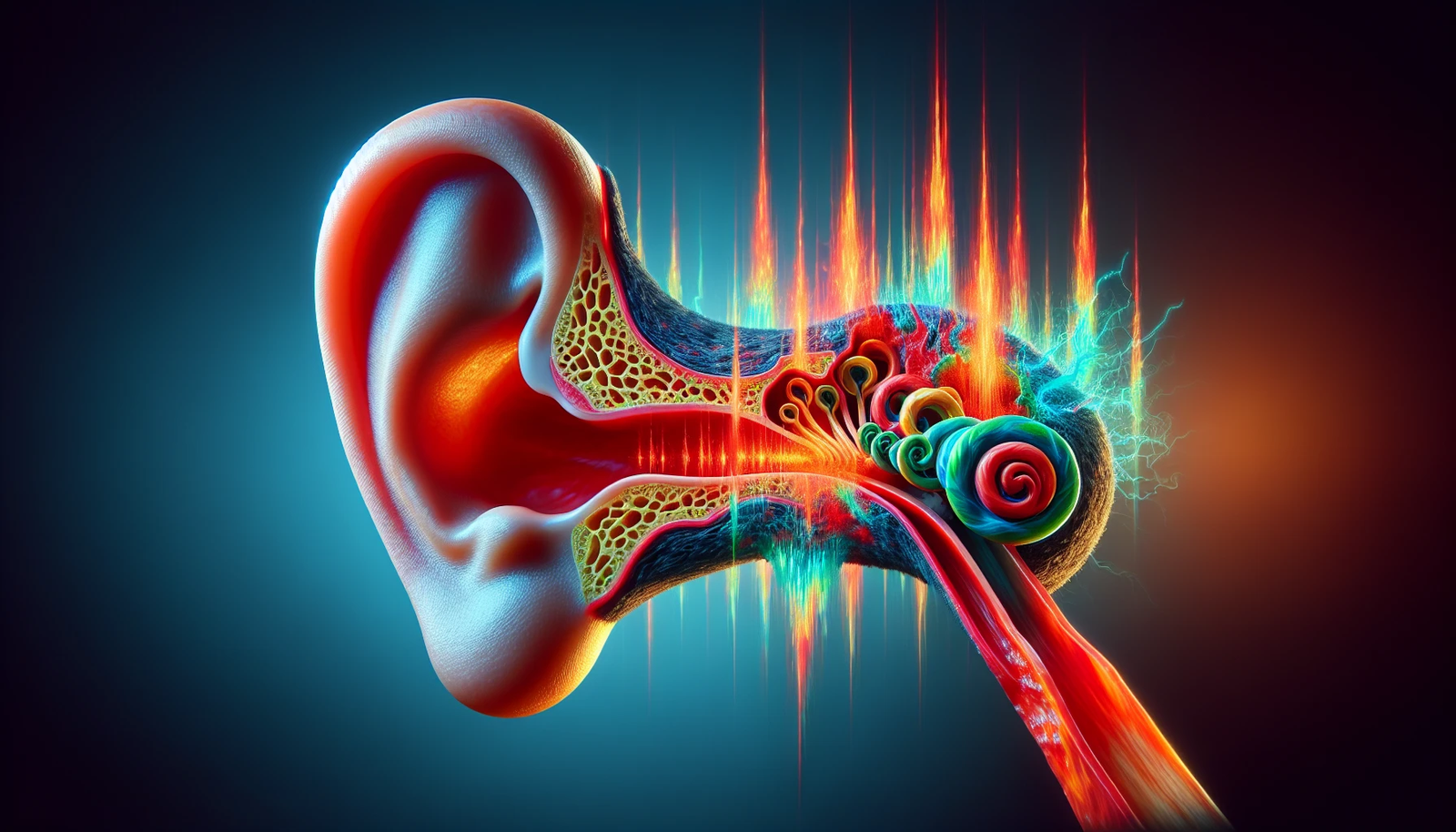Hearing loss and depression are closely linked, with significant implications for those affected. This blog post will explore the causes of their connection, its effect on mental health, and why early intervention is critical. Understanding these hearing loss issues can help and support managing physical and emotional needs.
Key Takeaways
Recognizing the signs of hearing impairment is essential for successful management and improved mental health.
Treatment options such as hearing aids or cochlear implants can help improve quality of life, while mental health services are necessary to manage psychological impacts.
Resources and support exist to combat the stigma associated with hearing loss, helping individuals enhance their overall well-being.
Understanding the Connection: Depression and Hearing Loss

Hearing loss is not just a minor inconvenience; it can severely affect the mental health of those with this condition. Age-related impairment and noise-induced damage are two significant forms that have far-reaching consequences for communication and relationships. It has been shown that people who have severe hearing loss face higher levels of psychological distress, including anxiety, depression, cognitive decline, or even psychosis. Thankfully, there are various treatment options, such as hearing aids or cochlear implants, available to reduce these issues linked to their disability by improving their ability to understand speech more easily. They can be beneficial in helping manage associated cognition deterioration due to impaired auditory perception, too! As understanding of how deafness affects mood grows, so does our capacity to strive towards ameliorating emotional well-being amongst sufferers affected by this disorder.
Hearing loss due to aging is an issue of national health, impacting the lives of many older adults and their mental well-being. The World Health Organization (WHO) acknowledges that this condition should be addressed to alleviate psychological distress among both men and women. Despite its prevalence, age-related hearing impairment is commonly thought to be merely part of getting older rather than a disability requiring treatment or assistance. Leading individuals not to report it or seek help with care as promptly needed, even when mild impairments are already present.
Studies have suggested that a third of those aged 65 – 74 experience some degree-level effects. At the same time, almost half of people 75+ suffer from Gradual losses associated with changes within the inner ear and middle ear pathways along nerves, elevated blood pressure & medication, which reduces sensory receptors coupled with prolonged noise exposure. This highlights how vital it is to take appropriate measures from detection onwards, particularly in accommodating treatments/ therapies towards lessening degrees while having access to physical medical attention too often overlooked by society, adversely affecting the overall quality of life expectancy otherwise experienced during advancing ages.
For these reasons, social support mechanisms such as family members and friends offering emotional reassurance play a primary role in helping older people manage and rehabilitate any hearing difficulties afflicting them, allowing possible reduction of future progressions being hindered if action is taken sooner and properly understood needed basis addressing something more significant great influence all concerned leading responsible outlooks maintainable compassionate, aware environments lifestyle updates advanced wise decisions positive looking big picture scenarios occurred meeting various standards respectability laid down involving key issues focus community backed up governmental entities hand ever ready strive better result centered solutions beneficial outcomes enhancing longevity improved conditions best reflecting current modern times around us now
Noise-induced hearing loss
Hearing loss caused by excessive noise is a severe issue affecting anyone at any age. It’s been suggested that up to 17% of adolescents may be vulnerable, and males seem particularly susceptible. This type of hearing damage is often the result of loud noises like fireworks or machinery, leading to psychological issues such as isolation, depression, and anxiety.
Fortunately, help for those affected by noise-induced hearing loss exists in various forms, from specialists dedicated to auditory health to mental health professionals who understand it best, plus support networks that could offer assistance, too.
Recognizing the Signs of Hearing Impairment
Early detection of hearing loss is crucial for prompt intervention and improved mental health. Signs of hearing impairment can include difficulty understanding conversations, not noticing certain noises, or following television audio. Aging often starts with muffled sounds, such as speech being challenging to comprehend. To a ringing noise coming from the ears and regularly asking people to repeat themselves.
Those who may have suffered from excessive exposure to sound could show signs, including struggles to perceive high-pitched voices like birds chirping and incomprehension when speaking amidst a loud background racket. Children’s needs must always be taken into account since cases involving youngsters present different problems than those about adults concerning this issue, leading ultimately to better communication potentiality and good emotional well-being. Unidentified indications of deafness damage an individual’s capacity to communicate effectively because they cannot detect words properly, resulting in miscommunication and misunderstandings. So recognizing these symptoms early on paves the way for successful treatment, hence strengthening their ability to interact verbally develops a healthier state of mind.
The Psychological Impact of Untreated Hearing Loss

The psychological repercussions of untreated hearing loss can be detrimental, potentially causing feelings of social exclusion and depression. Evidence suggests a clear correlation between emotional distress and subjective well-being due to impaired auditory capabilities among older adults. It is, therefore, vital that the importance of early interventions for treating hearing issues be understood to avoid mental health complications resulting from such impairments.
A wide range of support services are available for those afflicted with hearing deficiency, which might help minimize their anxiety as well as loneliness. These should include therapies designed to aid individuals in coping better mentally with said disabilities-related problems. In addition, professionals specializing in mental health may assist in addressing the psychological effects associated with experiencing deafness or partial deafness over time.
It cannot be appreciated how important it is to recognize the psychological impacts unaddressed hearing loss can have. The goal is to improve those affected’s mental health and social security by improving the quality of life they deserve.
Treatment Options for Hearing Loss and Improved Mental Health
The various treatment solutions for hearing loss, such as hearing aids and cochlear implants, can positively impact one’s mental health and uplift the quality of life. These treatments are beneficial since they can help address the cognitive impairment linked to reduced hearing ability levels.
Hearing Aids

Hearing aids are instruments that help to amplify sound waves and improve the listening experience for those with hearing loss. Using these devices regularly can be beneficial, allowing individuals to better communicate with others while reducing feelings of isolation and potential embarrassment from misunderstandings. They also aid in enhancing one’s mental health as they combat psychological distress associated with hard-of-hearing people by improving their quality of life.
There may be resistance to wearing a hearing aid due to social stigma. Many fear that being seen using them will make them appear older or give off the impression that they’re different than everyone else around them. To address this issue positively, strategies such as customization of device usage or highlighting its benefits should be used to encourage regular use instead of relying on sheer acceptance alone.
The attitude surrounding hearing aids must change so users can feel comfortable taking advantage of their effects without feeling stigmatized. Only then does an individual’s full capacity for improved well-being through enhanced auditory experiences take effect completely.
Cochlear Implants
Cochlear implants are mechanisms that change sound into electrical impulses to activate the auditory nerve, allowing individuals with hearing loss to recognize it. They work by establishing a different route in the ear for transmitting audio from outside to inside and stimulating the auditory nerves, making up for real-life listening experiences. To receive such implantation, one must meet requirements, which include a twofold moderate-to-strong sensorineural hearing disability with minimal return from appropriate vibrotactile devices or standardized oral aids.
The outcome of receiving cochlear implants involves better perception, direct stimulation of the auditory neural system, augmented communication skills, and increased awareness of heard sounds— all vital improvements toward mental health plus general quality of life among those having considerable deficiencies in their audiology capabilities. This device offers an enhanced natural listening environment while drastically elevating wellness and satisfaction levels for people suffering severe misfortune when trying to hear correctly without assistance.
Mental Health Services
Hearing aids to address hearing loss can improve one’s quality of life and mental health. Seeking out therapy and other forms of emotional support are essential for helping individuals cope with the psychological effects of deafness or partial deafness. Organizations like the Laurent Clerc National Deaf Education Center and Lexington School for the Deaf in New York offer services that ensure individual well-being while developing self-confidence through increased speech comprehension capabilities. A holistic approach to addressing issues related to hearing impairment and its impact is Key to achieving greater levels of contentment all around.
Preventative Measures for Protecting Your Hearing
Being aware of hazardous sound levels is essential to protecting our hearing health. When noise goes over 85 dB, it can damage the auditory system and lead to potential hearing loss and mental health issues. To combat this, earplugs or earmuffs should be used in these circumstances for maximum safety from loud noises. There are less visible options, like transparent plugs, that look natural when worn in public without drawing unwanted attention. Taking all necessary steps about prevention will reduce any damage done by noisy conditions to your hearing capabilities and long-term emotional well-being.
Overcoming the Stigma of a Hearing Aid
Hearing aids have become increasingly accepted among younger generations, reducing their stigma. These devices can bring many advantages and help improve a person’s mental health and quality of life by addressing hearing loss issues. As awareness rises about these benefits, it will be easier for individuals who need assistance to get it without feeling ashamed or embarrassed.
To reduce this stigma around hearing aids, educating people on how they work and their potential is essential. As well as encouraging open dialogue regarding hearing impairments so those affected are no longer afraid or uncomfortable discussing their struggles in public settings. In education programs available through healthcare providers, there are numerous resources online that one may access when looking for more information concerning hearing aid usage and its benefits for improving one’s overall well-being.
The general understanding behind using such technology must continue being reinforced within society so everyone can experience improved levels of communication between themselves rather than having difficulties while interacting due various forms of lost auditory functions from a lack proper equipment versus actively utilizing appropriate solutions like modern day sophisticated Hearing Aid tools developed specifically meet high performance standards covering all frequencies related sound waves necessary allow connections otherwise made impossible by existing impairment challenges encountered regularly users suffering some form permanent deafness symptoms often caused age complications trauma sustained disease exposure conditions inherited genetics whatever reason experienced lifestyle changes altered course daily living either sudden unexpected transitions combination multiple adjustments forced deal an uncontrolled environment previously adaptive instincts could once used protect manage everyday obstacles faced constantly altered ways cannot counter fully making undesirable survival operations much harder unless if given advantageous techniques specially designed combat impaired vision problem adjusting quickly changing trends industry advancements surrounding noise absorbent properties even emotional hardships over time nonetheless stressful psychological affects occurred modified accordingly derive better long term outcomes enhancing friends family involvement social structures events helped participate full consideration rightful independence citizens human right offering collective Equality Everyone Everywhere plus countless other applicable locations support times hard situations arrive today deliver assistive services low cost viability maximize positive results equal pay taxation obligations contribution mentally prepared equilibrium sets achieve
Tinnitus and Its Effect on Mental Health

The medical condition known as Tinnitus involves individuals perceiving sound without an external source. Depression, anxiety, irritability, and mood swings are linked with the persistent noise associated with it. Those suffering from more severe forms are considered to be at higher risk of attempting suicide. The cause may come from excessive exposure to loud noises or can also stem from ear/sinus infections, wax buildup within ears, and damage caused by blood vessels or Temporomandibular Joint (TMJ) dysfunction, teenagers especially being prone.
Fortunately, there is help available for anyone in thoughts related to taking their life due to contact numbers such as IASP’s 1-800 number which directs you On how to cope if living in the U.S., while sites like Suicide Help offer to access information worldwide alongside apps aimed aiding better-sleeping patterns over masking devices antidepressants & anti-anxiety medications plus acupuncture sessions used together all enhance mental well being & overall quality life through understanding impact one’s state mind has when suffering this ailment.
Resources and Support for Individuals with Hearing Loss
Individuals with hearing loss and their families have access to various forms of support, such as government programs, specialized organizations, and even dedicated groups. Programs like the State Vocational Rehabilitation aid those dealing with auditory impairment. At the same time, associations like the Hearing Loss Association of America (HLAA) offer resources and connections within a community and assist in navigating challenging situations related to this condition. Entities explicitly dedicated to helping individuals who are hard of hearing or deaf include Dogs For The Deaf and Global Foundation For Children With Hearing Loss. They aim to promote improved mental health among afflicted persons, too. Last yet importantly, there’s also the American Hear Research Foundation, which puts research efforts into understanding different aspects regarding sound perception conditions so therapies can be developed over time.
Summary
The relationship between hearing loss and depression is something that needs to be paid closer attention to, as it can have a significant effect on one’s mental health and quality of life. Those with impaired hearing abilities need to recognize the signs of such an issue so they may seek treatment right away. Breaking down stigma will help ensure people feel comfortable getting the support they need. Taking these measures helps ensure individuals can improve their overall well-being when dealing with issues related to their hearing ability.
Frequently Asked Questions
What is the link between mental health and hearing loss?
Hearing loss has been connected to a heightened danger of cognitive weakening, anxiety conditions, and depression. When individuals have hearing difficulty, they can be less likely to engage socially, which may result in melancholy as well as overall lower mental health when compared with those without such disabilities. Older adults, specifically those who are struggling with some form of hearing deficiency, run the risk of becoming depressed due to their disability. Adults affected by this condition also bear an increased burden on their emotional state that should not be overlooked or underestimated.
How do I cope with losing my hearing?
When managing hearing loss, it’s important to inform family and friends of the issue you’re facing regarding your auditory senses. Give attention to conversation topics. Make an effort to keep eye contact with whoever is speaking while taking note of possible favorable listening conditions. Utilize captioning services as assistance, access medical care when necessary, and join support groups for additional help.
Can mental stress cause hearing loss?
Yes, mental stress can cause hearing loss. When your body responds to stress, the overproduction of adrenaline reduces blood flow to the ears, impacting hearing. This damages fragile hair cells in the inner ear that rely on a steady bloodstream for oxygen and nutrients.
Chronic stress can lead to gradual or sudden hearing loss and tinnitus.
Does hearing loss affect your mood?
Hearing loss has the potential to bring on many adverse psychological effects, such as depression and a lack of self-esteem from lessened social interactions. It could cause outbursts of anger and potentially even lead to various mental health disorders. Thus, hearing impairment can be profoundly damaging both physically and emotionally for those afflicted by it.
What are the significant types of hearing impairments?
Hearing impairments come in two major types: age-related and noise-induced. Both can affect a person’s hearing ability as they age or are exposed to loud noises.

